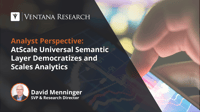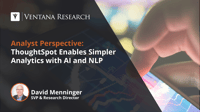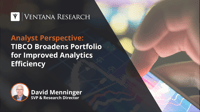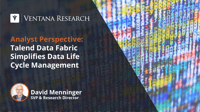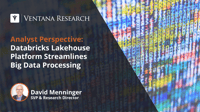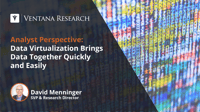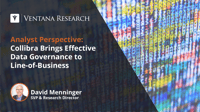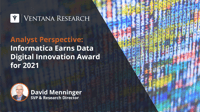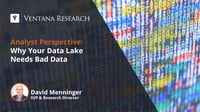Organizations of all sizes are dealing with exponentially increasing data volume and data sources, which creates challenges such as siloed information, increased technical complexities across various systems and slow reporting of important business metrics. Migrating to the cloud does not solve the problems associated with performing analytics and business intelligence on data stored in disparate systems. Also, the computing power needed to process large volumes of data consists of clusters of...
Read More
Topics:
Analytics,
Business Intelligence,
Data Integration,
Data,
data lakes,
data operations,
Streaming Analytics,
AI & Machine Learning
Organizations today have huge volumes of data across various cloud and on-premises systems which keep growing by the second. To derive value from this data, organizations must query the data regularly and share insights with relevant teams and departments. Automating this process using natural language processing (NLP) and artificial intelligence and machine learning (AI/ML) enables line-of-business personnel to query the data faster, generate reports themselves without depending on IT, and...
Read More
Topics:
embedded analytics,
Analytics,
Business Intelligence,
Data Integration,
Data,
natural language processing,
data lakes,
data operations,
AI & Machine Learning,
Data Platforms
TIBCO is a large, independent cloud-computing and data analytics software company that offers integration, analytics, business intelligence and events processing software. It enables organizations to analyze streaming data in real time and provides the capability to automate analytics processes. It offers more than 200 connectors, more than 200 enterprise cloud computing and application adapters, and more than 30 non-relational structured query language databases, relational database management...
Read More
Topics:
embedded analytics,
Analytics,
Collaboration,
Data Governance,
Information Management,
Data,
Digital Technology,
data lakes,
AI & Machine Learning
Talend is a data integration and management software company that offers applications for cloud computing, big data integration, application integration, data quality and master data management. The platform enables personnel to work with relational databases, Apache Hadoop, Spark and NoSQL databases for cloud or on-premises jobs. Talend data integration software offers an open and scalable architecture and can be integrated with multiple data warehouses, systems and applications to provide a...
Read More
Topics:
Analytics,
Business Intelligence,
Collaboration,
Data Governance,
Data Preparation,
Information Management,
Data,
Digital Technology,
data lakes,
AI & Machine Learning
Databricks is a data engineering and analytics cloud platform built on top of Apache Spark that processes and transforms huge volumes of data and offers data exploration capabilities through machine learning models. It can enable data engineers, data scientists, analysts and other workers to process big data and unify analytics through a single interface. The platform supports streaming data, SQL queries, graph processing and machine learning. It also offers a collaborative user interface —...
Read More
Topics:
embedded analytics,
Analytics,
Business Intelligence,
Collaboration,
Data Governance,
Data Preparation,
Information Management,
Data,
data lakes,
AI & Machine Learning
The technology industry throws around a lot of similar terms with different meanings as well as entirely different terms with similar meanings. In this post, I don’t want to debate the meanings and origins of different terms; rather, I’d like to highlight a technology weapon that you should have in your data management arsenal. We currently refer to this technology as data virtualization. Other similar terms you may have heard include data fabric, data mesh and [data] federation. I’ll briefly...
Read More
Topics:
Analytics,
Data Governance,
Data Integration,
Data,
Digital Technology,
data lakes
Collibra is a data governance software company that offers tools for metadata management and data cataloging. The software enables organizations to find data quickly, identify its source and assure its integrity. Line-of-business workers can use it to create, review and update the organization's policies on different data assets. Collibra’s software uses a microservice architecture and open application programming interfaces to connect to various data ecosystems. Its data intelligence cloud...
Read More
Topics:
business intelligence,
Analytics,
Data Governance,
Data Preparation,
Information Management,
Data,
data lakes,
AI & Machine Learning
Rapidminer is a visual enterprise data science platform that includes data extraction, data mining, deep learning, artificial intelligence and machine learning (AI/ML) and predictive analytics. It can support AI/ML processes with data preparation, model validation, results visualization and model optimization. Rapidminer Studio is its visual workflow designer for the creation of predictive models. It offers more than 1,500 algorithms and functions in their library, along with templates, for...
Read More
Topics:
embedded analytics,
Analytics,
Business Intelligence,
Collaboration,
Data Preparation,
Data,
data lakes,
AI & Machine Learning
The annual Ventana Research Digital Innovation Awards showcase advances in the productivity and potential of business applications, as well as technology that contributes significantly to the improved processes and performance of an organization. Our goal is to recognize technology and vendors that have introduced noteworthy digital innovations to advance business and IT.
Read More
Topics:
Analytics,
Business Intelligence,
Collaboration,
Data Governance,
Information Management,
Data,
Digital Technology,
blockchain,
data lakes,
AI & Machine Learning
Everyone talks about data quality, as they should. Our research shows that improving the quality of information is the top benefit of data preparation activities. Data quality efforts are focused on clean data. Yes, clean data is important. but so is bad data. To be more accurate, the original data as recorded by an organization’s various devices and systems is important.
Read More
Topics:
Data Governance,
Data Preparation,
Information Management,
Data,
data lakes
